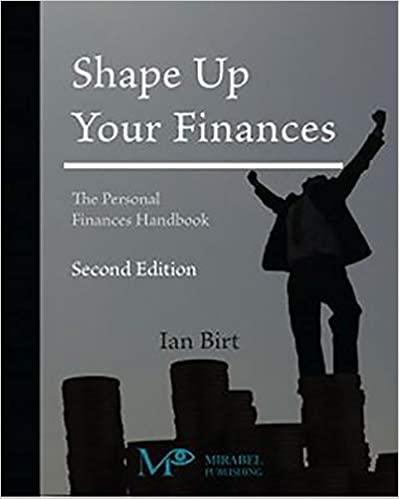Question
Q # 1: John and Jane are planning to buy a house. Here is what John said: I have $35,000 in my registered retirement savings
Q # 1: John and Jane are planning to buy a house. Here is what John said: I have $35,000 in my registered retirement savings plan. My spouse has no RRSP. I have roughly $60,000 in unused contribution room. We are planning on using the first-time Home Buyers Plan for my RRSP. My income is $80,000, my partners income is $35,000. We have over $50,000 in a joint savings account. Can I use $35,000 of that savings and put it into a spousal RRSP so that we can use the $35,000 from my own RRSP plus the $35,000 in the spousal RRSP? Whats the catch?
Q # 2: At age 90, Dorothy is more physically active than some much younger people, hiking, skiing and boating over the trails and lakes of her rural Ontario home. She feels she could live to be 105 so no wonder she worries about running out of money. When her husband died a few years ago, he left Irene his defined benefit pension plus a stock portfolio that had risen substantially in value. But when her husbands long-time broker retired, Dorothy was adrift, her account transferred to a stranger in Toronto. Now, with almost half of her $1.8-million portfolio sitting in her bank account, Dorothy is looking for advice on investments, tax planning and estate planning. She has no one advising her on any of her accounts, her daughter Milly writes in an e-mail. She wants to find the right balance for her age between simplicity and safety. Dorothys problem not a bad one to have is the substantial unrealized capital gain in her portfolio, which would trigger a big tax bill if she sells. Shes thinking of giving each of her three children an advance on their inheritance to lessen the tax burden in settling her estate when she eventually dies. Dorothy $29,000 a year in pension income, $11,700 in Canada Pension Plan benefits and $7,400 in Old Age Security, for a total of $48,100 before tax, indexed to inflation.
Q # 3. Client situation The people: Tess, 70, and Lee, 71 The Problem or Questions: Are their investments arranged in the most tax-efficient way? Should they continue contributing to TFSAs even though they must take the funds, or the securities, from their non-registered account, triggering a capital gain? Should they continue paying for long-term care insurance? Monthly net income: $16,040 or as needed. Assets: Bank accounts $31,850; her non-registered portfolio $952,600; her TFSA $97,430; his TFSA $93,835; her RRIF $385,655; his RRIF $706,415. Total: $2.27-million Monthly outlays: Rent $4,100; home insurance $75; electricity $80; housekeeping $200; home decorating $250; transportation $525; groceries $800; clothing $200; gifts, charity $350; vacation, travel $2,000; other discretionary $3,000 (furnishing, vehicle maintenance, major appliances); dining, drinks, entertainment $850; personal care $300; yoga $250; subscriptions $35; adult education $1,000; dentists, physio, chiropractor $900; drugstore $150; health insurance $310; long-term care insurance $325; phones, TV, internet $340. Total: $16,040 Liabilities: None Q # 4 Rose and Brad have enjoyed high-paying professional careers in the oil and gas industry, helping them to amass more wealth than they need for their lifestyle. Together, they earn about $500,000 a year before tax. Brad, 60, likes what he does and plans to keep working to age 70. Rose, faced with the prospect of an alluring buyout package, is tempted to take it even though shes only 48. She wonders to what extent the income she forgoes will be offset by lower income tax in the years ahead. They have two teenage children, a mortgage-free house in the Calgary area, an investment property and substantial savings. My husband and I are confident that we have saved enough for retirement, Rose writes in an e-mail. There may be an opportunity for me to take a voluntary severance package with my employer and we are interested in knowing what incentives there are for me to do so, such as a reduced tax burden in the future, Rose adds. She expects she would get about 14 months salary. If Rose leaves her job before she becomes eligible for early retirement at the age of 55, her defined benefit pension will not have vested and she will lose postretirement health benefits. We would like to know if there are financial incentives in the form of a reduced tax burden during retirement, she writes. Their retirement spending goal is $100,000 a year after tax. What tax strategies are available to minimize our tax exposure in retirement? Rose asks. Clients financial situation Monthly net income: $26,000 Assets: Bank accounts $60,000; her DC pension plan/LIRA $155,000; her RRSP $315,000; his RRSP $1-million; her TFSA $65,000; his TFSA $75,000; non-registered investment accounts $1.5-million; RESP $100,000; residence $900,000; rental real estate $310,000. Estimated present value of her DB pension $540,000. Total: $5.02-million Current monthly outlays: cellphones $150; utilities/internet/subscriptions $1,000; property/vehicle insurance $700; life insurance $300; property tax $700; vehicle repairs $200; home maintenance $200; groceries $2,000; entertainment $500, allowance $200; dining out $750; clothing $200; gifts $100; computer/electronics $100; charity $100; sports $150 vacation/travel $500; vet $100; other $550; RRSPs $4,000; TFSAs $1,000; RESP $500; non-registered savings $12,000. Total: $26,000.Savings capacity drops if Rose chooses the buyout. Liabilities: Mortgage on rental property $100,000
Step by Step Solution
There are 3 Steps involved in it
Step: 1

Get Instant Access to Expert-Tailored Solutions
See step-by-step solutions with expert insights and AI powered tools for academic success
Step: 2

Step: 3

Ace Your Homework with AI
Get the answers you need in no time with our AI-driven, step-by-step assistance
Get Started


